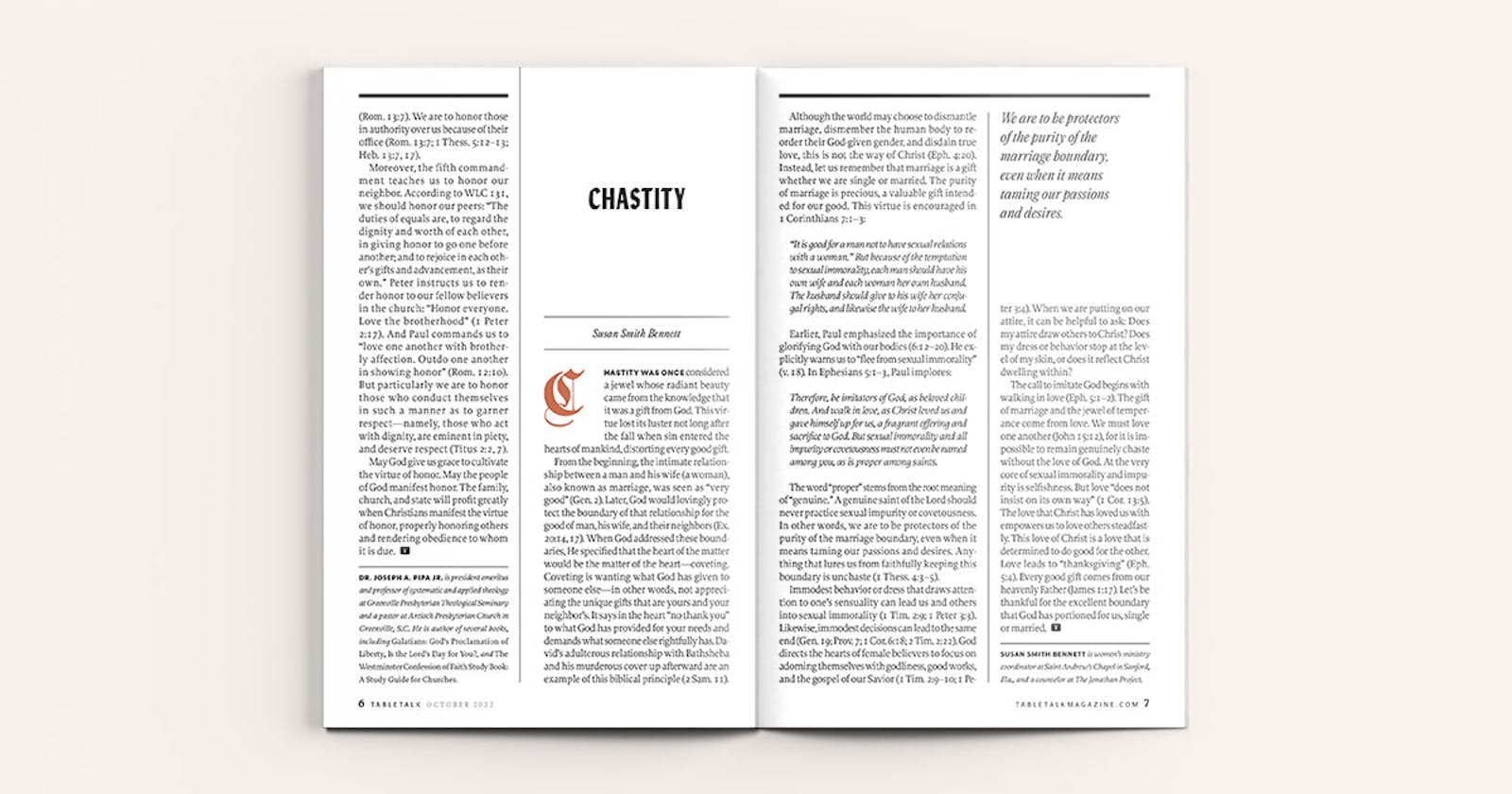
Request your free, three-month trial to Tabletalk magazine. You’ll receive the print issue monthly and gain immediate digital access to decades of archives. This trial is risk-free. No credit card required.
Try Tabletalk NowAlready receive Tabletalk magazine every month?
Verify your email address to gain unlimited access.
Chastity was once considered a jewel whose radiant beauty came from the knowledge that it was a gift from God. This virtue lost its luster not long after the fall when sin entered the hearts of mankind, distorting every good gift.
From the beginning, the intimate relationship between a man and his wife (a woman), also known as marriage, was seen as “very good” (Gen. 2). Later, God would lovingly protect the boundary of that relationship for the good of man, his wife, and their neighbors (Ex. 20:14, 17). When God addressed these boundaries, He specified that the heart of the matter would be the matter of the heart—coveting. Coveting is wanting what God has given to someone else—in other words, not appreciating the unique gifts that are yours and your neighbor’s. It says in the heart “no thank you” to what God has provided for your needs and demands what someone else rightfully has. David’s adulterous relationship with Bathsheba and his murderous cover-up afterward are an example of this biblical principle (2 Sam. 11).
Although the world may choose to dismantle marriage, dismember the human body to reorder their God-given gender, and disdain true love, this is not the way of Christ (Eph. 4:20). Instead, let us remember that marriage is a gift whether we are single or married. The purity of marriage is precious, a valuable gift intended for our good. This virtue is encouraged in 1 Corinthians 7:1–3:
“It is good for a man not to have sexual relations with a woman.” But because of the temptation to sexual immorality, each man should have his own wife and each woman her own husband. The husband should give to his wife her conjugal rights, and likewise the wife to her husband.
Earlier, Paul emphasized the importance of glorifying God with our bodies (1 Cor. 6:12–20). He explicitly warns us to “flee from sexual immorality” (v. 18). In Ephesians 5:1–3, Paul implores:
Therefore, be imitators of God, as beloved children. And walk in love, as Christ loved us and gave himself up for us, a fragrant offering and sacrifice to God. But sexual immorality and all impurity or covetousness must not even be named among you, as is proper among saints.
The word “proper” stems from the root meaning of “genuine.” A genuine saint of the Lord should never practice sexual impurity or covetousness. In other words, we are to be protectors of the purity of the marriage boundary, even when it means taming our passions and desires. Anything that lures us from faithfully keeping this boundary is unchaste (1 Thess. 4:3–5).

Immodest behavior or dress that draws attention to one’s sensuality can lead us and others into sexual immorality (1 Tim. 2:9; 1 Peter 3:3). Likewise, immodest decisions can lead to the same end (Gen. 19; Prov. 7; 1 Cor. 6:18; 2 Tim. 2:22). God directs the hearts of female believers to focus on adorning themselves with godliness, good works, and the gospel of our Savior (1 Tim. 2:9–10; 1 Peter 3:4). When we are putting on our attire, it can be helpful to ask: Does my attire draw others to Christ? Does my dress or behavior stop at the level of my skin, or does it reflect Christ dwelling within?
The call to imitate God begins with walking in love (Eph. 5:1–2). The gift of marriage and the jewel of temperance come from love. We must love one another (John 15:12), for it is impossible to remain genuinely chaste without the love of God. At the very core of sexual immorality and impurity is selfishness. But love “does not insist on its own way” (1 Cor. 13:5). The love that Christ has loved us with empowers us to love others steadfastly. This love of Christ is a love that is determined to do good for the other. Love leads to “thanksgiving” (Eph. 5:4). Every good gift comes from our heavenly Father (James 1:17). Let’s be thankful for the excellent boundary that God has portioned for us, single or married.
